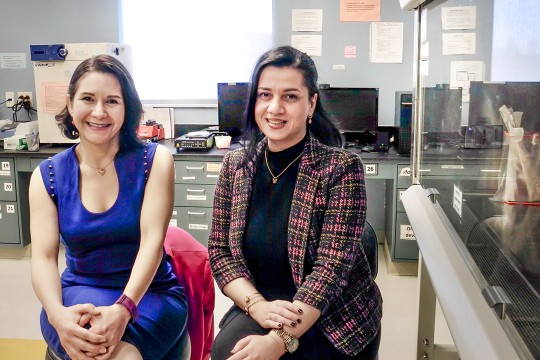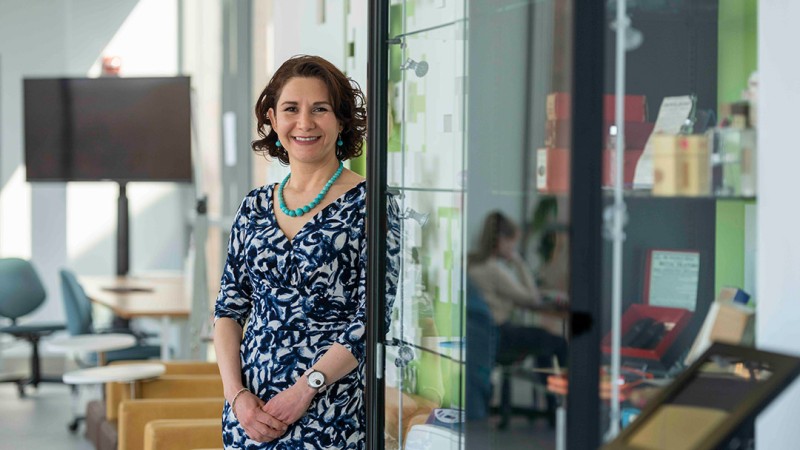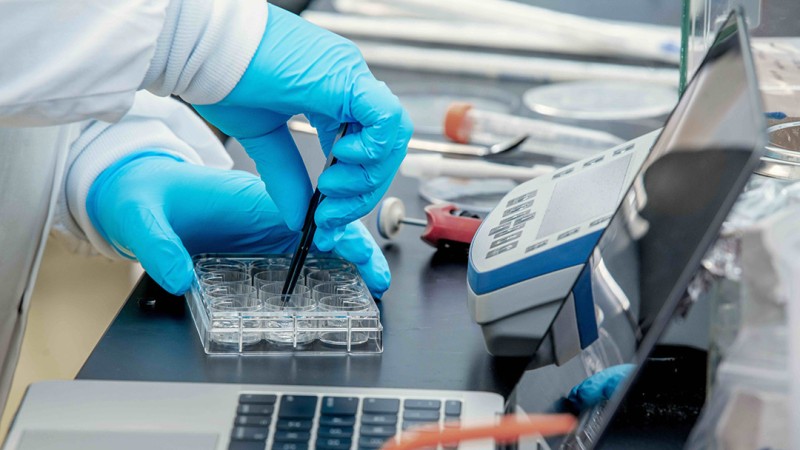Biomedical Engineering Master of Science Degree

Biomedical Engineering
Master of Science Degree
- RIT /
- Rochester Institute of Technology /
- Academics /
- Biomedical Engineering MS
RIT’s biomedical engineering MS produces professionals who can innovate solutions for today’s most pressing health care challenges.
Overview for Biomedical Engineering MS
Why Pursue a Biomedical Engineering MS?
STEM-OPT Visa Eligible: The STEM Optional Practical Training (OPT) program allows full-time, on-campus international students on an F-1 student visa to stay and work in the U.S. for up to three years after graduation.
Develop and Improve Technologies: Design equipment, devices, and processes such as artificial internal organs and prosthetics, pharmaceutical development and manufacturing processes, and machines for performing robotic-assisted surgery.
Pathway to Advanced Education: Use your degree as a pipeline to graduate study or an immediate gateway to a dynamic biomedical engineering career.
Accelerated to Impact: Complete your degree in just one year through a biodesign project and presentation sequence, so you can launch your career or advanced studies sooner.
The biomedical engineering master’s program produces nimble professionals who can leverage the power of technology, design, and engineering to make positive, powerful impacts on human health and patient care.
Biomedical Engineering Is Critical to the Future of Health Care
Biomedical engineering applies the principles and theories of engineering to solve problems in the wide-ranging fields of medicine and health care. Biomedical engineers can be found working alongside scientists, other engineering professionals, and medical practitioners to evaluate the complex, interdependent systems of the human body in order to develop and research effective solutions to improve or enhance a patient’s quality of life. These solutions can range from life-saving devices such as pacemakers and artificial organs; to life-enhancing mechanisms like prosthetics, artificial joints, and wearable medical devices; to medical instrumentation, such as next-generation MRI, CT, that enable more efficient medical procedures; to manufacturing processes involving live cells.
Biomedical Engineering Master's Requirements
Through core courses and electives, RIT’s biomedical engineering master’s program will provide the knowledge you need to develop and define your knowledge of biomedical engineering principles and practices to prepare you to design biomedical engineering systems that result in applications that improve and enhance the health and well-being of patients. Unlike traditional two-year, research/thesis-based programs, RIT’s one-year format lets you move from classroom to career faster, without sacrificing depth or rigor. The biomedical engineering master's program culminates in a two-course sequence in a biodesign project and presentation. You will conduct an assessment of a medical problem or challenge and develop a solution taking into account stakeholder and market analysis, and regulatory and intellectual property considerations. In the second course, you will use the knowledge gained in the first course to inform an advanced biodesign strategy that includes the design and fabrication of product concepts using rapid prototyping tools.
Careers in Biomedical Engineering
Biomedical engineering is a rapidly growing field with a variety of career opportunities for students with an interest in combining engineering with medicine. It’s a branch of engineering that uniquely leverages the vast knowledge base of biology and medicine to solve problems focused on health care and the human body. Biomedical engineers combine their knowledge of engineering with biology, anatomy, and physiology to create devices and systems for a variety of healthcare issues. The need for sophisticated diagnostic and therapeutic equipment, as well as manufacturing processes that use cell culture and tissue culture techniques, has fueled the demand for biomedical engineers who commonly work in multidisciplinary teams to develop devices, equipment, and processes for a number of applications.
Biomedical engineers can be found working in a variety of settings to improve the health and well-being of others, including biocompatibility testing, engineering artificial organs and tissues, developing new drug delivery systems, creating or modifying innovative medical devices, enhancing medical imaging techniques, or designing procedures to meet regulatory requirements: Positions are available in academia, hospitals and clinics, laboratories, manufacturing settings, and more. Biomedical engineers will find dynamic careers in which they are uniquely qualified to:
- Design systems and products, such as artificial internal organs, artificial devices that replace body parts, and machines for diagnosing medical problems
- Work with life scientists, chemists, and medical scientists to research the engineering aspects of biological systems of humans and animals
- Collaborate with pharmaceutical companies to develop new drug therapies
- Evaluate the safety, efficiency, and effectiveness of biomedical equipment
Biomedical Engineering: MS A Pathway to an Immediate Career or Advanced Study
The biomedical engineering master's program equips you to launch a career immediately after earning the degree or to pursue advanced study in any number of graduate or professional programs, including engineering, science, medicine, and healthcare professions.
-
Affordable Now. Valuable for Life.
Earn your master’s degree without the full price tag. With Master Up you can receive a 30% tuition scholarship for an RIT master’s degree.
-
Apply early for priority consideration for admission and financial aid.
Applications are accepted after the deadline, but are only considered on a space-available basis.
-
Meet us on-campus on February 19
Learn about the programs that interest you. Hear from program faculty, speak with current graduate students, and ask the questions that will help you get one step closer to your career goals.
Careers and Cooperative Education
Cooperative Education
What makes an RIT education exceptional? It’s the opportunity to complete relevant, hands-on engineering co-ops and internships with top companies in every single industry. At the graduate level, and paired with an advanced degree, cooperative education and internships give you the unparalleled credentials that truly set you apart. Learn more about graduate co-op and how it provides you with the career experience employers look for in their next top hires.
Cooperative education is optional but strongly encouraged for graduate students in the biomedical engineering master’s program.
Featured Work and Profiles
-
RIT Researcher Discovers New Micro-Technique That Differentiate Pathogens Faster
Pathogens like E. coli and SARS-Cov2 mutate and are often resistant to current vaccinations. RIT researcher Blanca Lapizco-Encinas found new ways to identify those mutations faster.
Read More about RIT Researcher Discovers New Micro-Technique That Differentiate Pathogens Faster -
RIT Researchers Develop Next-Gen Tools to Boost Precision in Cardiac Ablation Therapy
With NSF funding, biomedical engineering researchers are developing non-invasive tech that better assesses cardiac tissue response to thermal energy, a common therapy for both cancer and cardiac...
Read More about RIT Researchers Develop Next-Gen Tools to Boost Precision in Cardiac Ablation Therapy -
Researchers Unveil New Method to Track Cancer Cell Movement
Vinay Abhyankar Vinay Abhyankar, assistant professor of biomedical engineering, and doctoral students Mehran Mansouri and Indranil Joshi have developed a groundbreaking method to study how cancer cells follow...
Read More about Researchers Unveil New Method to Track Cancer Cell Movement
Curriculum for 2025-2026 for Biomedical Engineering MS
Current Students: See Curriculum Requirements
Students are also interested in
Admissions and Financial Aid
This program is available on-campus only.
| Offered | Admit Term(s) | Application Deadline | STEM Designated |
|---|---|---|---|
| Full‑time | Fall | February 15 priority deadline; rolling thereafter | Yes |
| Part‑time | Fall | February 15 priority deadline; rolling thereafter | No |
Full-time study is 9+ semester credit hours. Part-time study is 1‑8 semester credit hours. International students requiring a visa to study at the RIT Rochester campus must study full‑time.
Application Details
To be considered for admission to the Biomedical Engineering MS program, candidates must fulfill the following requirements:
- Complete an online graduate application.
- Submit copies of official transcript(s) (in English) of all previously completed undergraduate and graduate course work, including any transfer credit earned.
- Hold a baccalaureate degree (or US equivalent) from an accredited university or college in engineering (or a related scientific or technical field). A minimum cumulative GPA of 3.0 (or equivalent) is recommended.
- Submit a current resume or curriculum vitae.
- Submit a personal statement of educational objectives.
- Submit two letters of recommendation.
- Entrance exam requirements: GRE optional but recommended
- Submit English language test scores (TOEFL, IELTS, PTE Academic, etc.), if required. Details are below.
English Language Test Scores
International applicants whose native language is not English must submit one of the following official English language test scores. Some international applicants may be considered for an English test requirement waiver.
Duolingo (DET): 130
IELTS: 6.5
LanguageCert Academic: 74
PTE Academic: 60
TOEFL: 88/4.5
International students below the minimum requirement may be considered for conditional admission. Deaf and hard-of-hearing test takers with significant hearing loss do not need to take the listening and speaking sections for the TOEFL and IELTS. Each program requires balanced sub-scores when determining an applicant’s need for additional English language courses.
How to Apply Start or Manage Your Application
Cost and Financial Aid
An RIT graduate degree is an investment with lifelong returns. Graduate tuition varies by degree, the number of credits taken per semester, and delivery method. View the general cost of attendance or estimate the cost of your graduate degree.
A combination of sources can help fund your graduate degree. Learn how to fund your degree
Accreditation
Related News
-
December 3, 2025

RIT biomedical sciences students launch new community club
Biomedical sciences at RIT is more than a major—it’s a pathway to medical school and future careers. Recognizing the need for connection beyond the classroom, students founded the Biomedical Sciences Student Association to create a strong peer network and collaborative environment.
-
November 19, 2025

Venture Creations startup company is redefining breast cancer detection
BiRed Imaging, co-founded by Professor Satish Kandlikar, blends infrared camera capture, numerical simulation, and artificial intelligence-driven algorithms to accurately detect the presence, size, and location of tumors. The revolutionary process spares patients painful breast compression, radiation exposure, false alarms, and unnecessary anxiety.
-
May 14, 2025

New separation technique will improve lab-on-chip devices
Using a non-traditional, micro-organism separation method, researchers at RIT discovered a faster technique that can be used to distinguish cells that are resistant to antibiotics or cancer.
Contact
- Lindsay Lewis
- Senior Assistant Director
- Office of Graduate Admissions
- Enrollment Management
- 585‑475‑5532
- lslges@rit.edu
- Travis Meyer
- Graduate Program Director, Biomedical Engineering
- Department of Biomedical Engineering
- Kate Gleason College of Engineering
- 585‑475‑7407
- travis.meyer@rit.edu
Department of Biomedical Engineering

















